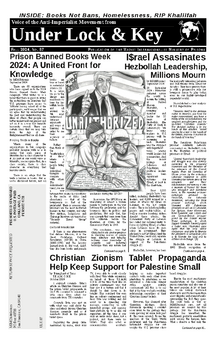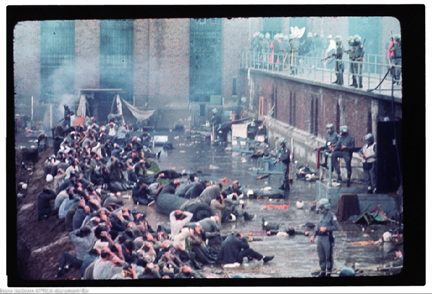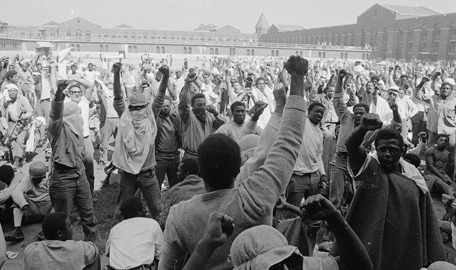
Organizing Against Apathy and Collusion in New York
Franklin Correctional Facility is a medium classification prison that does its best to oppress. Rules are broken on a constant basis by this administration. Their need to control every tiny moment and movement really displays their fears of us ever getting on the same page to take action. I’m not speaking riot, just trading info and court actions when it comes to confronting their gestapo tactics. The physical beatings in front of others by guards has placed fear into many hearts so that writing a grievance is taboo.
As an Orientation Facilitator, I used to inform those coming to this prison what to expect and how to protect themselves. Someone snitched on me and I was fired.
I wrote a total of 42 grievances but it was never enough for me. The next step was to meet the oppressors face to face, and I became the Inmate Liaison Committee (ILC) Chairman, and that’s when the fireworks started. Contempt and hatred for me was freely displayed. I stayed on my horse until I was set up with a misbehavior report that sent me to the box.
When I got out I tried to get back to the ILC but was always stonewalled. My so-called peers refused to assist me, claiming it would hamper their agenda and they don’t want any trouble. In other words they are comfortable and satisfied. Sellouts is what I call them. In order for any progress to take place snitches and sell-outs must be contained. Corrections depends on them for their services. The “I don’t want to get involved” types complain and bitch but don’t take any action. 1,700 prisoners reside here and about 20 will lay a pen game down. Law library sucks because the workers want to get paid to do nothing for you.
The prisoner organizations are so controlled that we are not allowed to advertise how to become a member. We are told what to spend and where to spend. I say let’s organize and write Corrections in Albany, but my prisoner peers say we don’t want to cause any trouble. How can people who weren’t afraid to break the law be afraid to write in defending yourself or make a point. Even if you don’t know how, ask someone. Make the pen your gun.
The capitalist company Corcraft runs sweatshops in this prison to make officer and prisoner clothing. Guys can’t wait to work for them because it pays the best in comparison to 10 to 20 cents an hour for other assignments. Commissary prices continue to increase.
Any time I attempt to band us together in writing grievances and Article 78s someone snitches on me. Microphones are placed in the library, chapel and other places we congregate. How can any movement get generated when dudes snitch or are going home soon? I have done all I can, but fear and the lack of education gives corrections an all-systems-go for future oppression in a big way. We are losing in this injustice system and a lot of us don’t care to know how to win. Organize!
MIM(Prisons) responds: Our work in the criminal injustice system in Amerika involves a constant battle between those who see the value in uniting to fight the system, and those who are taken in by the bribery offered by the prisons in exchange for complacency or snitching. This contradiction exists throughout the prison system in this country, but in some states we are winning more unity and strength while in others the anti-imperialist forces are still a small minority. New York state still does not have a grievance campaign while prisoners in twelve other states have already stepped up to push this important work forward. There was an important action last year in Auburn Correctional Facility in New York, where prisoners joined the food strike in California.
Activists must evaluate the conditions in their state and their prison, and then determine what they can do to most effectively educate and organize other prisoners. In some states this may involve mass protest, in others we are still at the point of building study cells and educating whoever is willing to talk with us. Wherever your struggle is at, MIM(Prisons) can provide material to help with the educating and organizing.
Related Articles:





 Alabama
Alabama
 Alaska
Alaska
 Arizona
Arizona
 Arkansas
Arkansas
 Army Post
Army Post
 California
California
 Colorado
Colorado
 Connecticut
Connecticut
 Delaware
Delaware
 District of Columbia
District of Columbia
 Federal
Federal
 Florida
Florida
 Georgia
Georgia
 Guam
Guam
 Hawaii
Hawaii
 Idaho
Idaho
 Illinois
Illinois
 Indiana
Indiana
 Iowa
Iowa
 Kansas
Kansas
 Kentucky
Kentucky
 Louisiana
Louisiana
 Maine
Maine
 Maryland
Maryland
 Massachusetts
Massachusetts
 Michigan
Michigan
 Minnesota
Minnesota
 Mississippi
Mississippi
 Missouri
Missouri
 Montana
Montana
 Nebraska
Nebraska
 Nevada
Nevada
 New Hampshire
New Hampshire
 New Jersey
New Jersey
 New Mexico
New Mexico
 New York
New York
 North Carolina
North Carolina
 North Dakota
North Dakota
 Ohio
Ohio
 Oklahoma
Oklahoma
 Oregon
Oregon
 Pennsylvania
Pennsylvania
 Puerto Rico
Puerto Rico
 Rhode Island
Rhode Island
 South Carolina
South Carolina
 South Dakota
South Dakota
 Tennessee
Tennessee
 Texas
Texas
 Utah
Utah
 Vermont
Vermont
 Virginia
Virginia
 Washington
Washington
 West Virginia
West Virginia
 Wisconsin
Wisconsin
 Wyoming
Wyoming


